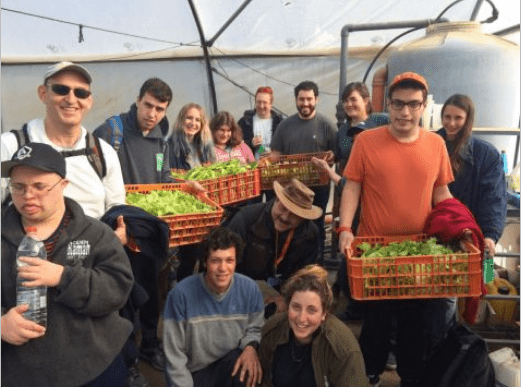In a special guest post for Covenant Classroom, Covenant Award recipient and Director of the National Ramah Tikvah Network Howard Blas shares some of the latest and greatest creative and original educational programming from Israel and reminds us yet again how the land of our ancestors is truly the original Covenant classroom.
Making the Most of Any Ability and Increasing Self-Confidence, too

At Kibbutz Tzuba in the Judean Hills, 15 minutes from the center of Jerusalem, teens who are struggling academically can now participate in a farming program where they learn skills and enjoy the feeling of success beyond the classroom walls. The founder of the program, Alon Greenboim (everyone calls him “Jumba,”) knows first-hand how traditional classrooms may not the learning environment of choice for everyone–but that everyone can learn by doing.
When he was a young boy, Jumba was assigned to work in the kibbutz apple orchard. There, he needed a ladder to reach the apples. He told himself then that if he were ever in charge, he would figure out a way to get the trees to grow horizontally so that shorter people would not need to climb a ladder to pick apples off the trees. Sure enough, today the entire apple orchard at Kibbutz Tzuba is made up of trees that grow out, not up.
It is this type of ingenuity that has allowed Jumba to grow a multi-million dollar agricultural business and also help young people who haven’t found their footing in traditional school, to accomplish and achieve in ways they never thought possible.
Thanks to a new program, Gdolim Bemadim, Special in Uniform, people with a wide range of disabilities can now serve in the IDF. In areas such as logistics, printing, supply rooms, food service, computers and more, this program allows soldiers with disabilities to build self-esteem, and the typical soldiers benefit as well. Yossi Kahana, Director of JNF (Jewish National Fund) Task Force on Disabilities and co-founder of the program, believes strongly that “if every soldier in the IDF had the opportunity to work side by side with people with disabilities, the potential to change attitudes in Israeli society [would be] tremendous.”
Learning Sensitivity and Compassion in the Dark

It is hard to give people a sense of what it might be like to experience life with a disability. But now, thanks to the Dialogue in the Dark program at the Israel Children’s Museum in Holon, visitors can experience a taste of what it’s like to be blind. Guides who are either visually impaired or blind lead visitors through the exhibit (which includes a port, market, pub and noisy pedestrian crossing)–and engage them in conversation about disability, coping and life in general. To cap off the experience, Nalagaat Blackout Restaurant (at The Na Laga’at Center, Ratzif HaAliya Hashnia, Jaffa Port), a short 3.5 miles (6 km) away, offers an opportunity to experience and enjoy a delicious kosher dinner in total darkness, served and guided by blind wait staff.
Teaching Peace… One Serve at a Time
Can coexistence be taught on the tennis court? Since the 1970’s, the Israel Tennis Center has been doing just that, through its Israel Tennis Centers (ITC) Coexistence Tennis Programs. The ITC aims to alter negative perceptions while instilling positive ones, through joint sporting activities held for Jewish, Arab, Druze and Bedouin children. Twinned kindergarten classes organized through the ITC bring together 60 children from an Arab kindergarten and a Jewish kindergarten weekly on one court, where they learn motor skills development and participate in sports activities at the ITC centers in Jerusalem, Jaffa and Akko.
Another ITC program, called “Doubles Coexistence,” pairs Arab and Jewish children as partners on the tennis court and encourages them to interact on and off the court, thereby building a bridge between the different cultures.



